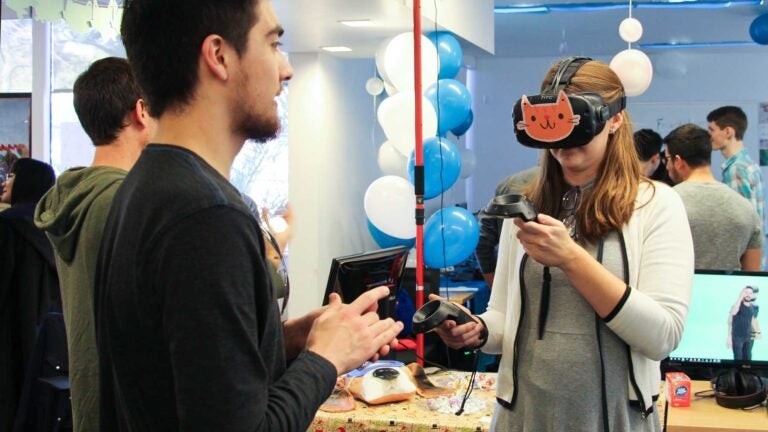
Students in the GamePipe Laboratory show Demo Day visitors how their games and apps work. (Photo/Jane Keranen)
Demo Day spotlights games about Vietnam, wild weapons and even origami
Executives, gamers and professors turn out to find the next big thing demonstrated by students at the USC GamePipe Laboratory
Think of yourself as a journalist in Vietnam or a strategist using outlandish weapons to fend off an army of angry foes.
Those are two of the scenarios played out in games demonstrated by students at the USC GamePipe Laboratory Fall Showcase, also known as Demo Day.
Twenty-five teams composed of students from the USC Viterbi School of Engineering and the USC School of Cinematic Arts showed off their wares, ranging in design from fully immersive virtual reality to iPhone and Android apps. Nearly 1,000 people were on hand throughout the day, including professors, gamers and executives eager to know about the next hot game.
Visitors had the chance to test all the games currently in development, including ones selected for development at last spring’s Demo Day.
Founded in 2005, the USC GamePipe Laboratory is the home of USC Viterbi School’s gaming-related majors, including a B.S. in computer science (games) and M.S. in computer science game development. Under Director Michael Zyda, the participants of GamePipe’s advanced games course, a year-long program currently in its 12th year, were present to showcase a semester’s worth of hard work.
Games in the pipeline
Since its creation, 2,000-plus students have graduated from the GamePipe Laboratory, Zyda noted.
“We, as an institution, have dominated an industry which generates billions of dollars into the U.S. economy annually,” he said.
The Princeton Review ranks USC Games, a joint a collaboration between USC’s Interactive Media & Games Division and USC Viterbi’s Department of Computer Science, as the No. 1-ranked game design program in the country.
Here are a few of the games that were available to test at GamePipe Lab’s mid-year preview:
At war
Embedded is a virtual reality game that takes players on a journey through the Vietnam War, giving them the chance to be a journalist writing a story on the conflict. The game forces players to face real-life deliberations and make snap decisions about photos and the angle of a story.
The outcome is based solely on your choices. The photos you take set the tone for the final article that recounts your experiences, and the questions you ask the soldiers in interviews will affect their mood.
“We wanted to make this game emotionally compelling,” said Osman Kaan Demiroz, a second-year M.S. student in computer science game development and one of the game’s programmers. “We want the outcome of the game to affect you.”
The game also rates your photos: the better the photos, the more prestigious the newspaper your article will appear in at the game’s end — which serves to broaden the player’s emotional connection by providing a sense of pride in the work.
Cannon fodder
Fan the Cannon, an immersive virtual reality game where you construct towers armed with various weapons, enables players to stop an onslaught of hungry cats from eating your beloved pet fish through the use of “ridiculous weapons,” according to Handa Zhang, a second-year M.S. student in computer science game development and one of the game’s creators.
The game is played using VR goggles and control sticks in each hand. First you create a tower, each with a different weapon, from a slingshot or an exploding fruit catapult to an array of musical weapons with notes that shoot out like bullets. The goal is to destroy the cats before they exit the room. The game ends with an attack by an enormous “boss” cat you must defeat to save your fish.
On a quest
Unfolded is played with a controller on a gaming console. You play Kiri, a character who must complete a quest despite a loss of memory. Throughout the game, Kiri learns that she has the ability to fold into different animals like origami; she also has the ability to use various weapons, harnessing new skills along the way.
The aforementioned teams, as well as five others selected in a previous semester, also could partner with MBA students from the USC Marshall School of Business to get assistance in production management, marketing and business plans.
“We are using input from the business students, as well as analytics from data, to help the design process and lead the project in the right direction through both organization and management,” said Jonathan Vincent, a second-year M.S. student in computer science and technical designer for Unfolded.
Zyda credited part of the success of the USC Games’ program to alumni, many of whom have come from the GamePipe Laboratory itself.
“A large part of why we’re the best in the world today is because we have the best connections,” Zyda said. “USC alumni comprise a major creative power advancing the gaming industry today.”
